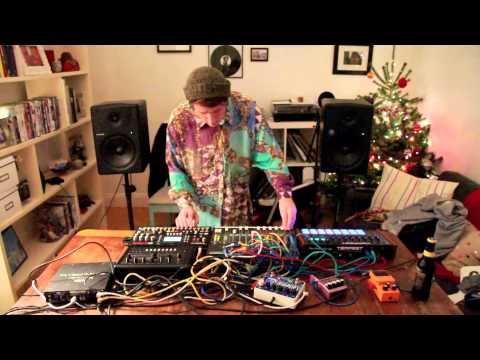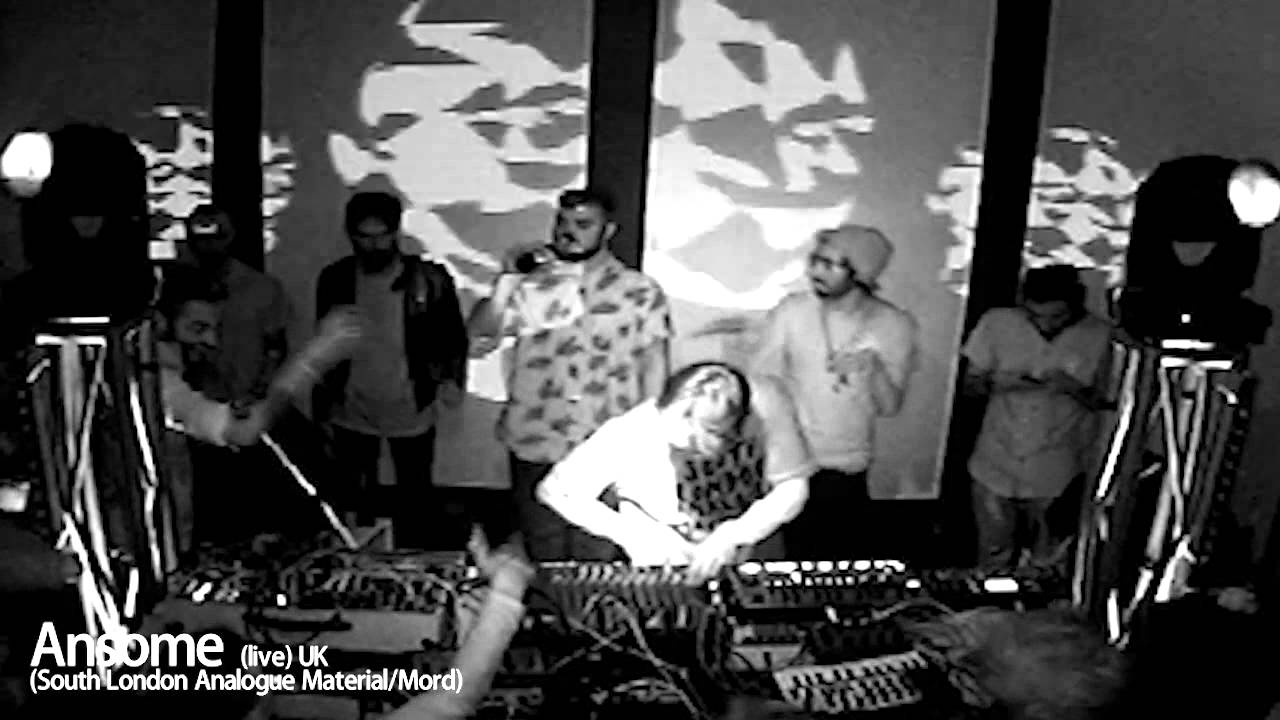Ansome finds himself well-poised. A relatively new name in UK techno, he’s beginning to see the fruits of a couple years of hard work spent running two labels: Discos Dead from 2013 until 2014 and now South London Analogue Material (S.L.A.M.), a platform for both his own releases and those of like-minded producers. A university student whose background lies in electronic music and sound design, Kieran Whitefield, for Ansome is he, moved to London for study, with the city becoming the centre of his musical interests as he immersed himself in the sounds of fellow Londoner Ali Wells, aka Perc, and his Perc Trax label, which has risen to international acclaim in recent years by pushing its sound in ever harsher and more experimental directions. Recent releases by Truss, Yuji Kondo, Mondkopf, Forward Strategy Group and others land quite far from the hefty sound Perc initially became known for, with Ansome, due to release an EP on the label shortly, emerges as one of the noisiest, pursuing gritty sonics through hardware-based, industrial-leaning experimentation that has been well-documented in videos of his scorching live PA sets.
Of course industrial music and techno is nothing new in the UK, as borne out by the long, intertwined history of the two genres, starting in the late 80s and continuing with the heyday of harshness ushered in by Surgeon, Regis, James Ruskin, The 65D Mavericks and many others. Inspired by both this and the newer outcroppings of the sound, arising as much from a return to hardware-based production methods as they have from a general resurgence of industrial and experimental sounds on techno dancefloors, Whitefield has become quite suddenly in demand. Young producers often find themselves not quite free to do as they wish in a market that frequently rewards conservative approaches more handsomely than it does more radical ones. Based both on experience and the luck of joining the fray when the strictures have loosened somewhat, Ansome has used the freedom afforded him to push his sound over the short course of time he’s been releasing.
Now, with more music tied up in the release process and his biggest local gig to date, as part of the expectedly heavy line-up celebrating the tenth anniversary of Perc’s label at Corsica tomorrow, it was a pleasure to chat to him over Skype to discuss the challenges of living in London and existing in the music industry, how current approaches are affecting his sound and his future in one of the most challenging eras yet for young producers entering the struggle.
How did you get involved in making music? Was it always techno for you?
Kieran Whitefield: I’ve always been quite hands on and involved in what I do and get a bit obsessed with it, so after I started DJing I immediately wanted to get more involved in the production side of it and give it 100 per cent. I went through a period of French house, then I got into dubstep when that came around, which is where I learned a lot of production techniques because it’s quite production-heavy. I got sick of that when it started getting really mental, so I went back into house and techno, and recently towards industrial.
I could hear the dubstep influences more on your first label, Discos Dead. I noticed quite a gap forming between your sound and the stuff you were releasing on the first label. Is that something you aim to address with the new one?
KW: I’ve stopped doing Discos Dead now because I’ve moved onto the more techno side of things. South London Analogue Material is my main label now. There are two releases [Catch & Ansome’s untitled 12" and Ansome’s ‘Tin’/’Cold Harbour’), but I think both are sold out at the distributors now. We’re just putting out our own stuff on S.L.A.M..
The first label I did I didn’t want to be a platform for my music. The music scene is quite small really, and with the internet you end up making quite a few friends quite quickly. With all of this music around me, I just felt the need to start something and start putting it out. This second label, S.L.A.M., I started intentionally to be a reflection of me and what my music is about. I was having loads of trouble with other labels on time-wasting and massive delays, so after the experience I had running my first label I decided that I could probably do it for myself better. S.L.A.M. is a platform for our music, and Discos Dead was a label of music that I liked but not necessarily stuff I was making.
The industrial techno thing has been going on in the UK for a few years now and also especially in Berlin. Was there something that particularly drew you to it?
KW: It has the power that attracted me to dubstep, but it’s not cheesy and is even more powerful actually, with all of the texture.
It seems the rawness of a lot of that music is based on people moving from a more software-driven setup to a lot more machines and hardware that tends to be a bit dirtier anyway.
KW: You can create stuff that you’d just never dream of on a computer. It has a nice warmth to it, whereas on a computer you’d just get very digital-sounding stuff.
So when was it that you started moving in that direction, with the changeover in your studio?
KW: It was quite a conscious decision when I first started making music: I wanted to go towards hardware the entire time. It’s what attracted me to it.
A good number of people that I know who are more traditional musicians simply find it easier to make music on machines instead of sitting in front of a computer all day.
KW: I think for me it’s self-justification, because I’ve never given the time to learn to play any instruments, so I overcompensate for that so I can feel more like a musician. If you just come straight onto a computer, it can be a bit weird. Music is very natural and to use hardware you can just get out what you’re feeling. On a laptop it’s kind of a struggle. I still use a computer to mix everything down and arrange stuff and it would be a nightmare to do that without it, but the original ideas I come up with on the modular.
Yes, I saw a few videos you’ve recorded of your hardware sets online and you set-up seems to be changing quite fast. A lot of my friends have been starting with the modules recently as well.
KW: I’ve got an addiction to hardware. I’m constantly buying new stuff and experimenting with different bits. I’m also quite into electronics and like to build some of the units and circuit bend stuff. It’s always changing. The modules give you so many options and look wicked with all of the patch cables.
If you were to talk about specific labels and artists, which ones have been worth mentioning to you recently?
KW: A lot of Perc Trax stuff and also Mord, which I released on, is constantly firing out amazing tracks.
Is there something going on with you at Perc Trax? I sensed a relationship developing there.
KW: Yes, I’ve got an EP coming up there soon. Perc Trax is where I went to when I first started listening to this kind of music, so it’s kind of an honour to release on the label.
Since you’re in London, besides older producers like James Ruskin or Regis, he would be the local source that represents that style of music most consistently.
KW: I’ve also been getting quite into Regis recently. I just bought quite a few of his records. I got ‘Baptism’ from the Paris/Berlin: 20 Years Of Underground Techno compilation. I’ve been getting into all of the British Murder Boys stuff as well.
Those are brilliant. Some of it is more like noise than techno really.
KW: I prefer it; those are my favourite tracks. I really like those. It’s nice to have a bit of variety on a release as well. Not every track is banging techno. It’s nice.
I think it’s also a function of the climate in the music scene right now. If you go back to Perc, some of his newer music has been very industrial and isn’t really techno at all, and this is also happening in Berlin. It’s good for people who are starting up now because the overall expectations from the audience are a bit looser than they often are.
KW: If you’re doing releases all of the time and you constantly do the same dancefloor tracks, you’re going to sound the same. It’s nice to switch up a little bit. I think when you strip back the techno elements – take away the kick drums and rolling rhythms – it really shows where you’re going with your sound.
Did you start your new label as a response to the slowness of getting music out elsewhere?
KW: South London Analogue Material I run with Catch and Ossian to release our own music; no messing about, just get it out there. Catch lives in Berlin at the moment now though, he’s moved, and my friend Ossian has stepped in to sort stuff out, so it’s not all on me. I go to university with Ossian and he makes techno also; we play live together sometimes. We’ve played in Italy and we’re playing in Belgium together next week. Ossian is planning to do a release on S.L.A.M., and he’s doing a remix for me as well. There’s loads of stuff but it’s all delayed and not out yet.
I know about the problems with getting things through the pressing plants. That must be a particular headache for running a label. It’s a bit strange that all of the internet stuff is so fast but right now you just can’t get a record out. What numbers are you pressing for your releases?
KW: Yes, that’s the main issue. You have to wait three or four months to get a record out, and by the time it comes out it’s so old that you’ve moved to somewhere else and it’s just killing it. With our releases we do vinyl only, and once they sell out we’re never going to repress them. It’s not for money. If you miss it, it’s gone, and it makes it more collectible and more unique. We’re doing 300 pressings, and they go out quite quickly. I quite like the idea of them being gone quickly, and there’s less financial risk as well.
So the gig you have for Perc Trax ten-year anniversary – this is one of the bigger ones you’ve had in London right? Ten years for a label is a really long time.
KW: I’ve played three times at Corsica now, the first in the second room and the second in the third, but this time I’m playing in the main room and from 2-3 am, which is quite a nice time.
So besides your upcoming release for Perc Trax, do you have anything else in the pipeline?
KW: I’ve made quite a lot of music – my Mindcut EP should be coming out in a couple of weeks. It’s the first artist EP on the label. I’ve got another EP that’s already been sent off for mastering but I don’t think I’m allowed to talk about that yet. There are about three or four EPs that are done and ready to come out.
Ansome plays Slowly Exploding: 10 Years of Perc Trax at Corsica Studios tomorrow night alongside Perc & Truss, Factory Floor live, Nik Void live, Powell, Pete Swanson, Randomer and Avus. While tickets are sold out, there will be some on the door and keep an eye out for resales here. For more information on Ansome click here and click here for more information on MN2S




